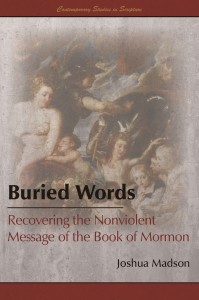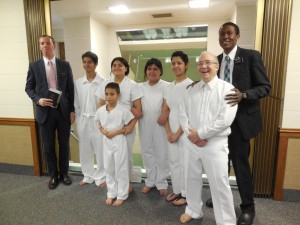
The Book of Mormon presents a touching exchange between husband and wife. In a moment of tension, the prophetic figure Lehi attempts to console his wife Sariah’s fears that she has lost her sons and that she and her husband will likewise die a terrible death in the wilderness. The account presents Lehi’s prophetic conviction as words of consolation:
“But behold, I have obtained a land of promise, in the which things I do rejoice; yea, and I know that the Lord will deliver my sons out of the hands of Laban, and bring them down again unto us in the wilderness” (1 Nephi 5:7)
At this point in the narrative, Sariah feels she has lost everything, including her four sons whom Lehi had sent to Jerusalem to obtain a religious record. The account itself is depicted as the words of Nephi, the Book of Mormon’s first narrator. As narrator, Nephi identifies his father’s intention with this statement:
“And after this manner of language did my father, Lehi, comfort my mother, Sariah” (v. 6).
From Nephi’s perspective, his father did not rebuke Sariah for her complaints. Instead, Lehi demonstrates compassion and seeks to provide “comfort” through his spiritual convictions of a “promised land” for his posterity. “The boys will return,” the Prophet states, “and we will obtain a promised land.” Still, the narrative makes clear that Lehi’s effort to comfort was only partially successful. Immediately after this description, the account states:
“And when we had returned to the tent of my father, behold their joy was full, and my mother WAS COMFORTED” (v. 7)
The repetition of the word “comfort” proves meaningful. From a literary perspective, Lehi sought to comfort his wife through his prophetic words, but comfort as a completed action came only when Sariah physically held her sons in her arms. Lehi tries to comfort, and when the boys return, she “was comforted.”
When the Book of Mormon is read synchronically, this exchange can serve as a type of foil for another allusion to comfort. Though the Book of Mormon presents the Book of Alma as an account that derives from a separate record from Nephi’s Small Plates, Lehi’s effort to comfort his wife stands in contrast to the way the Book of Mormon presents the power of deity to comfort. In Alma 17, the narrator depicts the spiritual power of a group of men known as the “sons of Mosiah.” As a result of their faithfulness in seeking God’s word, the account reads:
“And it came to pass that the Lord did visit them with his Spirit, and said unto them: Be comforted. And they were comforted” (Alma 17:10)
In this instance, God speaks a command, “be comforted” and the narrative demonstrates his divine power with complete fulfillment, “and they WERE comforted.” This reference to the ability of the divine word to produce immediate results reflects the literary pattern readers of the creation narrative in Genesis 1 encounter where God speaks and the account responds by depicting completed action:
“God said, ‘Let there be an expanse in the midst of the water, that it may separate water from water’… And it was so.” (Gen 1:6-7).
No matter how powerful a man may be in uttering inspired words as a prophetic mouthpiece (i.e., the role Lehi fulfills in the Book of Mormon), comparing these two episodes on “comfort” presents a profound theological message. Unlike human beings, including his prophets, God has a unique power to speak. Divinity speaks, and it is so.











